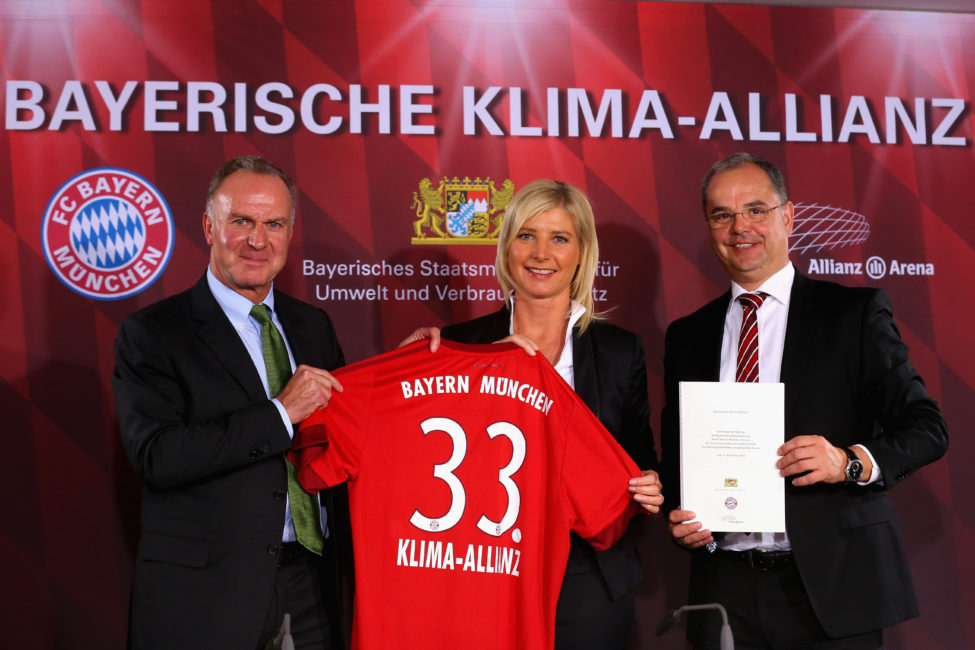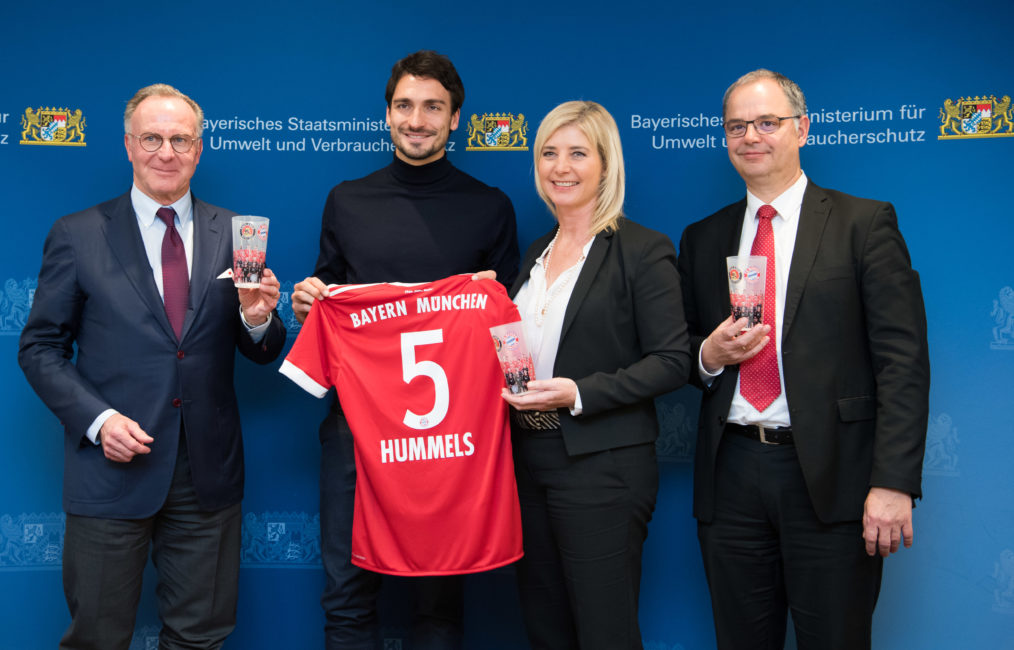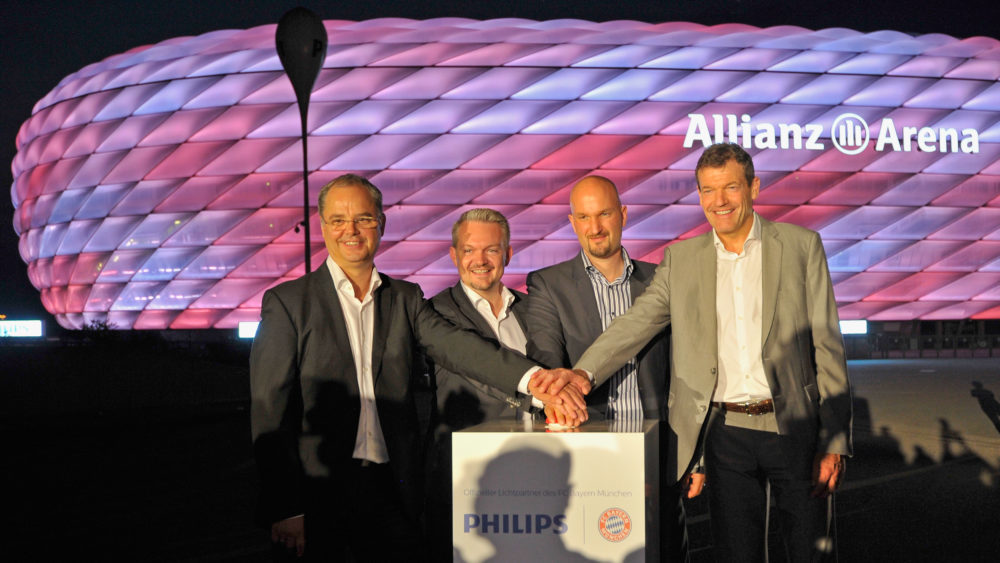Climate protection and German football – Part 2
After the first article was about the state of environmental protection football in general, the second part will deal with the German record champions in specific. In an interview, Jürgen Muth, the managing director of Allianz Arena GmbH, and Christopher Keil, director of public affairs and CSR, explained the plans of FC Bayern to me.
FC Bayern’s plans
What about the treble winners of 2020, who repeatedly emphasise their exceptionality in so many respects? Is FC Bayern a role model in terms of sustainability, too? What my research reveals straight away: The Allianz Arena has been certified with the European eco-label since 2016, takes part in Earth Hour and has recently managed to reduce its power consumption by up to 60 percent thanks to a new LED lighting system. The Allianz Arena has switched to a reusable deposit-based cup system, which according to the German Environmental Aid Association is more environmentally friendly than disposable cups from the fifth use onwards.
Away from the Arena, from 2020 on all players have been supplied with an electric car provided by one of their main sponsors and wear shirts made of recycled plastics. However, at the same time they used a chartered plane for a trip to Los Angeles which was previously flown empty from Doha to Munich on a six-hour flight.

(Image: Alexander Hassenstein/Bongarts/Getty Images)
I wanted to make sense of such contradictions and asked FC Bayern directly. I spoke in detail with Jürgen Muth, the managing director of Allianz Arena GmbH and Christopher Keil, as a representative of FC Bayern München AG, about the topic of environmental sustainability at the club
Muth told me that a Sustainability Strategy 2030 was currently being drawn up for the entire FC Bayern group by board member Andreas Jung, one of the cornerstones of which was tackling FC Bayern’s CO2 footprint. Three areas of action were identified for this purpose, the first two of which concern the club itself and its internal processes. The third area focuses on external factors, such as the arrival and departure of fans.
Act first, talk later
The topic of sustainability is close to the heart of FC Bayern and the operators of the Allianz Arena. For example, the club sat down and debated the planning and implementation of a climate-neutral stadium with one of their sponsors. However, as Muth assured me, the club does not intend to make mere symbolic gestures accompanied by loud media fanfare in order to look good in public. Rather, they intend to implement climate protection measures only when they are well thought through, effective and sustainable. There are things that can be implemented more quickly and others that take more time.
So what are the concrete plans? In his role as managing director of the Allianz Arena GmbH, Jürgen Muth is responsible for the energy supply of all of FC Bayern’s sporting premises and also looks after the main office at Säbener Strasse. The aim for all these venues is to switch to green, renewable power as soon as possible, increase energy efficiency and improve the club’s ecological balance through a decentralised energy supply.
FC Bayern is unable to fully supply the Allianz Arena with energy from their own solar energy system, given that it has an annual demand of almost 17 GWh. Thus, even running at full capacity, the installed solar capacity does not come anywhere near covering even the most basic needs during typical matchday operations. Therefore, the club seeks to start several projects to extend their renewable energy production together with partners. A first such project is the construction of a combined heat and power plant, which has been in the planning stage for some time, but had to be delayed in the aftermath of the Covid-pandemic.
Other clubs may already be one step ahead in terms of the energy supply of their stadiums, but FC Bayern’s plans are aimed at finding a holistic solution. For them it is important to convert the entire club with all its locations, otherwise they risked losing their credibility as an environmental trailblazer, says Jürgen Muth, who is a leading voice for sustainability at the club.
Matchday mobility
The same applies to CO2 compensation. FC Bayern are determined to set themselves a credible target. Achieving climate neutrality by the year 2030 is the clubs vision. Measures are being derived accordingly, such as compensation for CO2 emissions. However, besides compensating the club also wants to try to reduce their overall climate gas output. One example is the recent trip to Salzburg in the Champions League by bus instead of plane. For some people this is a matter of course, but in current competitive sports it is unfortunately often an exception – see Basel-Gate in part 1 of our story.
When it comes to mobility, Bayern collaborate closely with their automotive partner. The club’s fleet of vehicles used by players, coaches and officials has been converted to electric cars and a corresponding charging infrastructure has been set up at the training ground and is in the process of being set up at the Allianz Arena. The next logical step now must be to make it possible for fans to charge their electric vehicles during matches at the stadium parking ground. Such a plan exists, however, there are some roadblocks on the way, e.g. infrastructural requirements.
Nevertheless, the managing director is thinking big and envisions a future scenario where the parking grounds at the Allianz Arena are opened for commuters, who could then continue their journey into the city by public transport while, ideally, simultaneously charging their electric vehicle. A desirable, but admittedly still distant future.
While we are on the topic of public transport: As one of the few clubs in the Bundesliga, the ticket to the match does not double as a ticket to the city subway system. According to Muth, this is due to the congestion of the underground network, the large number of available parking spaces and the long distances travelled by those arriving. Nevertheless, I would wish that the club could work out a better solution with the Munich Transport Association. However, Muth says this is currently not forseeable.
One way that FC Bayern actively pursues in regard to transportation is to optimize the flow of incoming and departing spectators via car-sharing. This is one of the ideas from the club’s current sustainability initiative “The Mission” for which several groups of German and international students have developed and presented ideas in five thematic areas (green energy, data processing, reduction of food waste, mobility and club community) on how FC Bayern could make the stadium experience more climate-friendly and sustainable. All these projects are now developed further, in part in collaboration with partners. Later, up to twelve ideas are going to be implemented.
On the subject of catering, Muth points out that there are two food stands where vegetarian pizzas and eight food stands where vegan sandwiches are available, offering a broad range of foods for the food-conscious stadium visitor. But he also admits that this concept must be rolled out to other venues as well. In my opinion, the offer could be promoted more prominently or made available at more food stands so that going for the vegetarian option would become as much a normality as opting for conventional food.
Change through persuasion, not coercion
My idea of dedicating a matchday to the issue of environmental sustainability in close collaboration with the partners of FC Bayern was well received by my discussion partners. The same applies to the topic of nominating an environmental ambassador from the players’ circle, as Annika von Fridays For Future had demanded. However, there is not yet a timetable for these measures.

(Image: Sebastian Widmann/Bongarts/Getty Images)
However, there are concrete plans for a section on the club’s website where fans can inform themselves about the efforts the club undertakes to improve sustainability in all its forms, from social to environmental. This would serve as a one stop shop for the interested fan to get an overview. In addition, the section is also planned to convey FC Bayern’s core messages and values – specifically with respect to education, the reduction of inequality and health – and to link them to concrete actions.
Finally, I asked Jürgen Muth about the climate audit brought up by Patrick Fortyr. While the Allianz Arena is already certified according to the highest environmental standard in the EU, an additional independent audit could provide further insights: Where are you currently? What are you goals? And what would be appropriate targets and measures to reach them? Although there are no concrete plan for any of this yet, the topic has been escalated to board level already. Muth, like Fortyr, does not totally rule out that the DFL will tighten up their licensing requirements in this area.
Environmental sustainability is an essential issue for football.
So how should professional football be assessed in terms of environmental sustainability? And: Does football have to address this issue or is football as a spectator sport such a crucial element of a society’s recreational and cultural basis that a certain level of irrational behavior is allowed? That to me certainly seems to be the central question.
My answer is clear: Environmental sustainability is an issue that football must not ignore. By setting a good example, it can lead the way and greatly help convey the need for ecological sustainability to the world. Of course, football is also to some extent a romantic retreat from the world’s major problems, but it is also sets the agenda in many areas through its actions. Environmental sustainability is just such an issue.
Many clubs have already recognised this and are beginning to challenge their conventional ways of thinking. Most clubs are aware of their social responsibility. In many places, more is already being done than one might think. There are many examples of this in the Bundesliga alone. Of course, many things are still far from the ideal vision that Annika from Fridays For Future or Patrick Fortyr from CO2OL imagine, so their suggestions are timely and important. But the trend is clear: football is becoming increasingly sustainable. And no club can ignore it.
How to rate FC Bayern’s efforts at environmental sustainability?
The issue is high on the club’s agenda. In some areas I would like to see an even more ambitious timetable or targets, and some of their priorities might be debatable. But I do appreciate the fact that those responsible think holistically and bigger than their own club and that they want to act first and talk later. This is the FC Bayern as I see it and like to see it. Also, it is great that the common fan is encouraged to approach the club with their own suggestions and ideas.
But it will also be the role of the media and this blog in particular to critically examine and accompany this process. Therefore, I will revisit this issue in a year from now at the 2021 winter break and look what progress has been made till then.
What can you do as a fan?
Of course, nobody should have to forgo visiting the stadium, so my advice is to travel by public transport or try to organise a carpool. Calculate your CO2 footprint for the journey and compensate it. Let your club know that you care about sustainability and encourage them to take action.
Let us hope that it will come to pass that you may be able to visit the stadium in 2030 and charge your electric car in the multi-storey parking lot, enter a stadium heated and lit by a combined heat and power unit that runs on 100% renewable energy to enjoy a visit to the stadium to watch a match that makes you proud of your club in every single respect, not just for its achievements on the pitch.









